| Listing 1 - 10 of 249 | << page >> |
Sort by
|
Book
ISBN: 0333289137 0333289145 Year: 1982 Publisher: London Macmillan
Abstract | Keywords | Export | Availability | Bookmark
 Loading...
Loading...Choose an application
- Reference Manager
- EndNote
- RefWorks (Direct export to RefWorks)
Drama --- American literature: authors --- anno 1970-1979 --- anno 1960-1969
Book
ISBN: 8215031900 8215030211 8215065732 Year: 2019 Publisher: Oslo Universitetsforlaget
Abstract | Keywords | Export | Availability | Bookmark
 Loading...
Loading...Choose an application
- Reference Manager
- EndNote
- RefWorks (Direct export to RefWorks)
Unik sosiologisk analyse av den første arbeidsinnvandringen fra Pakistan til Norge tidlig i 1970-årene.
Immigrasjon --- Historie --- Integrering --- 1970-1979 --- Norge --- Noreg --- Pakistan
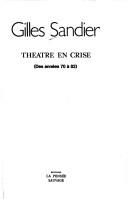
ISBN: 2859190457 9782859190453 Year: 1982 Publisher: Grenoble: La Pensée sauvage,
Abstract | Keywords | Export | Availability | Bookmark
 Loading...
Loading...Choose an application
- Reference Manager
- EndNote
- RefWorks (Direct export to RefWorks)
Theatrical science --- anno 1970-1979 --- France --- Vingtième siècle --- Théâtre --- Après 1970 --- Sandier, Gilles
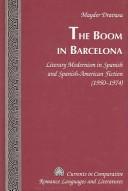
ISBN: 0820468274 Year: 2005 Publisher: New York, N.Y. Lang
Abstract | Keywords | Export | Availability | Bookmark
 Loading...
Loading...Choose an application
- Reference Manager
- EndNote
- RefWorks (Direct export to RefWorks)
Fiction --- Spanish literature --- anno 1970-1979 --- anno 1960-1969 --- anno 1950-1959
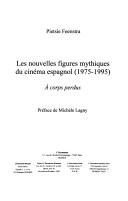
ISBN: 9782296013216 229601321X Year: 2006 Publisher: Paris Harmattan
Abstract | Keywords | Export | Availability | Bookmark
 Loading...
Loading...Choose an application
- Reference Manager
- EndNote
- RefWorks (Direct export to RefWorks)
Film --- anno 1970-1979 --- anno 1980-1989 --- anno 1990-1999 --- Spain

ISBN: 3445015198 Year: 1977 Publisher: Meisenheim am Glan Hain
Abstract | Keywords | Export | Availability | Bookmark
 Loading...
Loading...Choose an application
- Reference Manager
- EndNote
- RefWorks (Direct export to RefWorks)
German literature --- Comparative literature --- anno 1960-1969 --- anno 1970-1979 --- Germany --- LITTERATURE ALLEMANDE (R.D.A.) --- HISTOIRE ET CRITIQUE
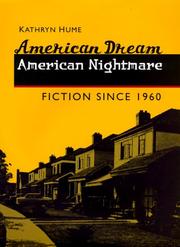
ISBN: 0252025563 0252070577 Year: 2000 Publisher: Urbana, Ill. University of Illinois Press
Abstract | Keywords | Export | Availability | Bookmark
 Loading...
Loading...Choose an application
- Reference Manager
- EndNote
- RefWorks (Direct export to RefWorks)
In this celebration of contemporary American fiction, Kathryn Hume explores how estrangement from America has shaped the fiction of a literary generation, which she calls the Generation of the Lost Dream. The expansive future promised by the American Dream has been replaced, Hume finds, by a sense of tarnished morality and a melancholy loss of faith in America's exceptionalism. American Dream, American Nightmare examines the differing critiques of America embedded in nearly a hundred novels and points to the source for recovery that appeals to many of the authors. Hume's discussion covers a broad range of contemporary writers, including T. Coraghessan Boyle, Ralph Ellison, Russell Banks, Tim O'Brien, Maxine Hong Kingston, Walker Percy, N. Scott Momaday, John Updike, Toni Morrison, William Kennedy, Julia Alvarez, Thomas Pynchon, Leslie Marmon Silko, and Don DeLillo.
Fiction --- American literature --- Psychological study of literature --- anno 1980-1989 --- anno 1960-1969 --- anno 1970-1979 --- anno 1990-1999
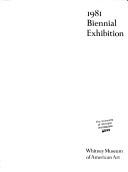
ISBN: 0874270324 Year: 1981 Publisher: New York, N.Y. Whitney Museum of American Art
Abstract | Keywords | Export | Availability | Bookmark
 Loading...
Loading...Choose an application
- Reference Manager
- EndNote
- RefWorks (Direct export to RefWorks)
Acconci, Vito ; Adams, Robert ; Amenoff, Gregory ; Anastasi, William ; Anger, Kenneth ; Armajani, Siah ; Arnoldi, Charles ; Aycock, Alice ; Bailey, William ; Bartlett, Jennifer ; Benglis, Lynda ; Benning, James ; Borofsky, Jonathan ; Brakhage, Stan ; Breer, Robert ; Brewster, Michael ; Buckner, Barbara ; Burton, Scott ; Callahan, Harry ; Callis, Jo Ann ; Chase, Louisa ; etc.
Art --- art [fine art] --- anno 1970-1979 --- anno 1980-1989 --- United States --- art [discipline] --- United States of America
Book
ISBN: 9780198729174 9780199560981 Year: 2014 Volume: *20 Publisher: Oxford [etc.] Oxford University Press
Abstract | Keywords | Export | Availability | Bookmark
 Loading...
Loading...Choose an application
- Reference Manager
- EndNote
- RefWorks (Direct export to RefWorks)
"The postwar period is no longer current affairs but is becoming the recent past. As such, it is increasingly attracting the attentions of historians. Whilst the Cold War has long been a mainstay of political science and contemporary history, recent research approaches postwar Europe in many different ways, all of which are represented in the 35 chapters of this book. As well as diplomatic, political, institutional, economic, and social history, the The Oxford Handbook of Postwar European History contains chapters which approach the past through the lenses of gender, espionage, art and architecture, technology, agriculture, heritage, postcolonialism, memory, and generational change, and shows how the history of postwar Europe can be enriched by looking to disciplines such as anthropology and philosophy. The Handbook covers all of Europe, with a notable focus on Eastern Europe. Including subjects as diverse as the meaning of 'Europe' and European identity, southern Europe after dictatorship, the cultural meanings of the bomb, the 1968 student uprisings, immigration, Americanization, welfare, leisure, decolonization, the Wars of Yugoslav Succession, and coming to terms with the Nazi past, the thirty five essays in this Handbook offer an unparalleled coverage of postwar European history that offers far more than the standard Cold War framework. Readers will find self-contained, state-of-the-art analyses of major subjects, each written by acknowledged experts, as well as stimulating and novel approaches to newer topics. Combining empirical rigour and adventurous conceptual analysis, this Handbook offers in one substantial volume a guide to the numerous ways in which historians are now rewriting the history of postwar Europe"--Provided by publisher.
History of Europe --- anno 1900-1999 --- 940.57 --- 940.55 --- Geschiedenis van Europa--(1970-1979) --- Geschiedenis van Europa: Eigentijdse geschiedenis--(1945-heden) --- 940.55 Geschiedenis van Europa: Eigentijdse geschiedenis--(1945-heden) --- 940.57 Geschiedenis van Europa--(1970-1979) --- Europe --- History --- Historiography --- anno 1940-1949 --- anno 1950-1959 --- anno 1960-1969 --- anno 1970-1979 --- anno 1980-1989 --- anno 1990-1999 --- anno 2000-2009 --- 1945-....
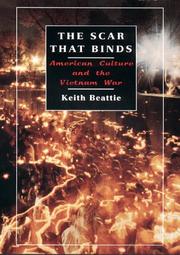
ISBN: 0814713262 0814798691 0814709109 0585424896 9780814709108 Year: 1998 Publisher: New York New York University Press
Abstract | Keywords | Export | Availability | Bookmark
 Loading...
Loading...Choose an application
- Reference Manager
- EndNote
- RefWorks (Direct export to RefWorks)
At the height of the Vietnam War, American society was so severely fragmented that it seemed that Americans may never again share common concerns. The media and other commentators represented the impact of the war through a variety of rhetorical devices, most notably the emotionally charged metaphor of "the wound that will not heal." References in various contexts to veterans' attempts to find a "voice," and to bring the war "home" were also common. Gradually, an assured and resilient American self-image and powerful impressions of cultural collectivity transformed the Vietnam war into a device for maintaining national unity. Today, the war is portrayed as a healed wound, the once "silenced" veteran has found a voice, and the American home has accommodated the effects of Vietnam. The scar has healed, binding Americans into a union that denies the divisions, diversities, and differences exposed by the war. In this way, America is now "over" Vietnam. In The Scar That Binds, Keith Beattie examines the central metaphors of the Vietnam war and their manifestations in American culture and life. Blending history and cultural criticism in a lucid style, this provocative book discusses an ideology of unity that has emerged through widespread rhetorical and cultural references to the war. A critique of this ideology reveals three dominant themes structured in a range of texts: the "wound," "the voice" of the Vietnam veteran, and "home." The analysis of each theme draws on a range of sources, including film, memoir, poetry, written and oral history, journalism, and political speeches. In contrast to studies concerned with representations of the war as a combat experience, The Scar That Binds opens and examines an unexplored critical space through a focus on the effects of the Vietnam War on American culture. The result is a highly original and compelling interpretation of the development of an ideology of unity in our culture.
Sociology of culture --- anno 1970-1979 --- anno 1960-1969 --- United States --- Vietnam War, 1961-1975 --- Influence. --- Civilization --- United States of America
| Listing 1 - 10 of 249 | << page >> |
Sort by
|

 Search
Search Feedback
Feedback About UniCat
About UniCat  Help
Help News
News